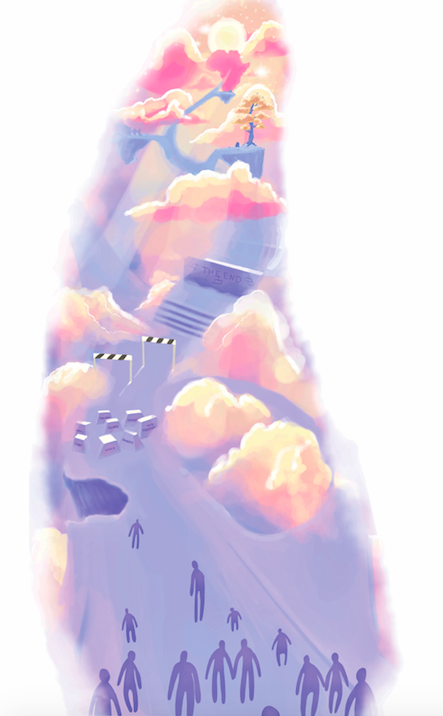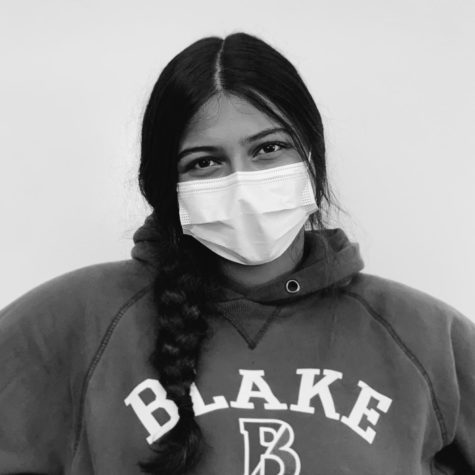What happens after you die? It’s an age old question to which people have a wide range of responses. World Religions teacher, Maggie Bowman, explains the connection between afterlife and religion saying, “I see the question of afterlife, or more broadly, what comes after this physical life, as something that is common for all of the worlds religions… different religious traditions answer the question in different ways.”
Bowman, who grew up in a Christian household, experienced a shift in beliefs as she studied world religions in college: “The academic pursuit of religion, the more I got into that, the less that it appealed to me in a personal or spiritual sense … somewhere between the age of 19 and 22, I probably would’ve said ‘No, I’m no longer a Christian…’ and part of that just stems from my inability to reconcile what is traditionally a Christian God…with the world that we live in. Those two things don’t mesh for me.”

PK-12 Equity & Instruction Chair, Lora McManus-Graham, also experienced a shift away from Christianity. She attended a Catholic school during her childhood and noticed that her beliefs strayed from the norm early on: ìI was taught that you go to heaven, and that’s where you meet God, and then we often talked about what does God look like, and everybody said that God wears sneakers and is a clean cut white guy. I always thought God was a peacock because my parents taught me that God transcended gender and was all genders and all beings, and so I always thought God looked like a peacock…I thought that you would float up to the sky and meet the peacock and there would be a curtained off area and you could meet your family who died.”

Since then, McManus-Graham has grappled with various different beliefs saying, ìIn college, I took a class on atheism and skepticism that sort of made me think more about it, [and] I think…it wouldn’t be a terrible idea if you just became part of the Earth…I know some people who believe in multiple lives, and so that’s something that I’ve grappled with a ton, so thinking about if I don’t meet a really big goal in this life, at least I could do it in my next life…î Overall, she feels as though she’s “on the fence” about believing in an afterlife.
English teacher, Anil Chandiramani also went through a shift in his beliefs, expressing, ìI was raised a staunch Hindu and the more I read, the more I learned about Hinduism and other religions, the more I thought they were interesting, but the more that I also realized that I just couldn’t believe. Things didn’t add up for me in my mind … I … found myself as a child engaging in all kinds of rituals, like various sorts of prayers, various other ceremonies, and I guess I never really understood why I was doing them, so when I started to read some of the doctrines that described those rituals and those ceremonies, and they kind of explained their origins, I began to understand the meaning of them, but I guess I just couldn’t bring myself to accept the assumptions that those texts made and the foundational principles.”

In regards to the idea of hell, Bowman shares, “I think personally … when I was a Christian, the idea of hell didn’t appeal to me as a person, and so I think not only is there diversity between the religions, I think there’s also diversity inside traditions as well. I kind of think that no two Christians are going to think exactly the same thing about heaven and hell. There’s a lot of diversity within groups too.”
McManus-Graham provides an example of this diversity in belief saying, “Growing up queer, especially at a Catholic school, there was always this threat of … ‘you’ll go to hell,’ and I think that also really influenced my thinking, thinking about this place that’s supposed to be a hot inferno that nobody wants to go to, and just being with other people who are also LGBTQ and other people who are also “sinners” in various ways … I always thought if we all go to hell, it’s going to be one big party down there; I’m so excited for it, I’m pumped. It’s going to be all the really boring people up in heaven who are very square and straight and everybody’s who’s really cool will be down in hell, so I’m down for it if that’s what happens.”
As far as the discussion of afterlife at Blake, Chandiramani shares his experience recalling, “When I’m providing that contextual information for a religion like Hinduism, I guess the reactions I get are either curiosity, which is always great, but more often than that, I think I’m met with disbelief and complete incredulity … like people can’t really believe this … maybe it just has to do with the age group of those students that I dealt with…For example, I taught a 12th grade elective on South Asian literature for a number of years, and we’d spend some time talking about Islam and Hinduism and I was absolutely not met with that kind of disbelief and incredulity from seniors.”
Chandiramani connects this feeling to the environment at Blake in general explaining, “I think there’s also ways in which the institution acknowledges as valid certain religions and not others. For example, without fail I never receive an email on Diwali saying, ‘Teachers and community beware, it’s Diwali, it’s a huge holiday. Here’s what it entails; be mindful of student commitments when assigning homework.’ I never get [an email] for Christian holidays because we don’t have school. Every now and then I’ll get one for Muslim holidays, and I’ll always get one for Jewish holidays. What I’m pointing out isn’t novel…I’ve talked to people about it before, but I don’t see this changing unfortunately. I wish it would. I remember one year too, we had conferences scheduled over Diwali. I mean could you ever imagine having anything scheduled over Christmas? In that way, I think the institution … unconsciously offers more credulity and validity to certain faiths over others. So it’s precisely that that might be related to the way that students in ninth grade respond to Hinduism.”
McManus-Graham sees similar trends in the lower school saying, “Talking about in the lower school … there are various phrases that teachers and parents use alike, like … ‘permanent nap time’ or ‘they went on a permanent vacation’ whereas other people are very straightforward [and say] ‘they died,’ and other people are like “they died and went to heaven.”
In regards to mourning death, Bowman asserts, “I think that moment of mourning, or humanity, or connection between two people sometimes elicits a religious response or sympathy even from somebody who doesn’t necessarily prescribe to a particular religion.”







